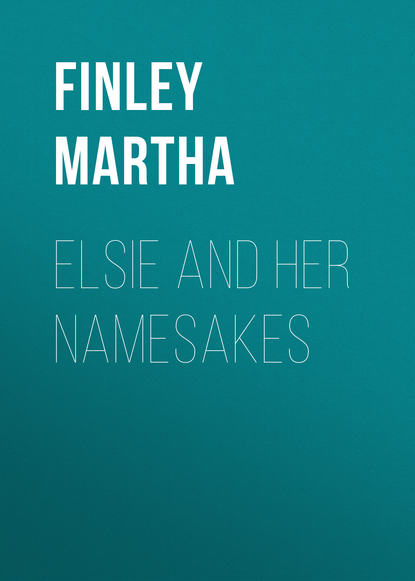По всем вопросам обращайтесь на: info@litportal.ru
(©) 2003-2024.
✖
Elsie and Her Namesakes
Настройки чтения
Размер шрифта
Высота строк
Поля
"This was a most important transaction, and its completion gave equal satisfaction to both parties. Livingston said, 'I consider that from this day the United States takes rank with the first powers of Europe, and she is entirely escaped from the power of England;' and Bonaparte said, 'By this cession of territory I have secured the power of the United States, and given to England a maritime rival who at some future time will humble her pride.'
"And that seems like a prophecy which came true, when one thinks of Jackson's victory on the 8th of January, 1815," remarked Grandma Elsie.
"Yes," assented the captain; "that was a signal overthrow to British troops on the plains of Louisiana."
"Yes; I remember that was a great victory for our United States troops," said Elsie Dinsmore. "But who of our folks took possession now that it was bought from the French, and just when did they do it?"
"It was on the 20th of December of that same year," replied the captain, "that General Wilkinson and Governor Claiborne, who were jointly commissioned to take possession of the country for the United States, entered New Orleans at the head of the American troops. The French governor gave up his command, and the tri-colored flag of France gave place to the star-spangled banner."
"Oh, that was good," said Elsie Dinsmore; "and was Louisiana made a State at once, captain?"
"No," he replied; "it was erected into a Territory by Congress in 1804. In 1810 the Spanish post at Baton Rouge was seized by the United States forces under General Wilkinson and the territory connected with it added to Louisiana, which in 1812 was admitted into the Union as a State."
"But, papa, was what is now the State of Louisiana all we bought from France by that treaty of 1803?" asked Grace.
"No, by no means," replied the captain. "The territory purchased by that treaty is now occupied by the States of Louisiana, Arkansas, Missouri, Iowa, Minnesota, Kansas, Nebraska, Oregon, Dakota, Colorado, Utah, Wyoming, Montana, Idaho and Washington."
"My, what a big purchase it was!" cried Ned. "But how did France get so much?"
"No doubt she just helped herself," laughed his sister. "The State went out of the Union in the time of the Civil War, didn't it, papa?"
"Yes; on the 26th of January, 1861, but was readmitted into the Union on the 25th of June, 1868."
CHAPTER XII
"These stories of the States have been very interesting to me, captain," remarked Mr. Lilburn, breaking a little pause which had followed the conclusion of the brief sketch just given of the early history of Louisiana.
"I feel flattered that my crude efforts in that line should be so highly appreciated," returned the captain, with a gratified smile as he spoke, then added, "And now, if you feel like making a return in kind, Cousin Ronald, suppose you give us a page or two of Scottish history, than which I think there is hardly anything more interesting."
"I acknowledge that it is very interesting to me, a native of that land, though now feeling myself a full-fledged American, but how is it with these younger folk?" returned Mr. Lilburn, glancing inquiringly around upon the ladies and children.
It was Grandma Elsie who answered in tones of pleased anticipation, "Indeed, cousin, I should be delighted; for to me the history of that grandfather land of mine is only secondary in interest to that of this, my dear native land, largely peopled by the descendants of those who struggled so bravely for civil and religious liberty in Scotland."
"Ah, cousin mine, I am glad to ken that you care for that auld fatherland o' yours and mine," returned the old gentleman, smiling affectionately upon her. "There are many passages in her history that are interesting and heart stirring to the pride and love of the descendants of the actors in the same. But to what particular passages in her history shall I call your attention now?"
The query seemed addressed to all present, and Elsie Dinsmore answered quickly and earnestly, "Oh, tell us all you can about that beautiful, unfortunate Mary, Queen of Scots. I suppose you must have seen all the palaces and castles she ever lived in there in Scotland?"
"Yes, my bonny bairn, I have, and regard them with great interest because of her one-time occupation of them. Linlithgow Castle is now only a picturesque old ruin, yet one may stand in the very room, now roofless, to be sure, where Queen Mary was born. The walls of that castle were very thick and strong, but not then deemed strong enough to protect the royal infant, born on the 7th of December, 1542. There was rejoicing at her birth, but it would have been greater had she been a lad instead of a lass. Her father, then on his deathbed, exclaimed when he heard the news, 'Woe to the crown of Scotland; it came with a lass and it will go with a lass.'
"Her sex was a disappointment to Scottish hearts, yet still they loved her, and would do all in their power to protect and defend her, especially from the English King, Henry VIII., with whom they were then at war, and who was doing all in his power to get possession of the little princess, purposing in time to marry her to his son, and so unite the two kingdoms under one crown."
"Why, that would have been a fine way to put a stop to the fighting between the two kingdoms, I should think," said Elsie Dinsmore.
"Perhaps, if he had offered good terms, but those he did offer were so harsh that Scotland's Parliament rejected them, and for greater security both Mary and her mother were taken from Linlithgow to Stirling Castle, a grand fortress atop of a lofty hill above the beautiful valley of Monteith. It seemed a safe place for the bonny baby queen, but some wicked, treacherous men formed a plot to carry her off to England; but it failed because her guardians were so very cautious as never to admit more than one person at a time to see her.
"So many dangers threatening her, it was thought best to crown her queen as soon as possible, and when she was nine months old she was one Sunday morning taken from her nursery to the chapel of the castle. There one of her nobles held her on the throne and spoke for her the words she should have spoken had she been old enough. Then the Cardinal held the crown over her head, and for a moment clasped her tiny fingers about the scepter, and buckled the sword of state around her waist. Then every peer and prelate present, one after another, knelt before her, held his right hand above her baby head, and swore to defend her with his life. But alas, alas! few o' them proved faithful to their oath.
"A strange life lay before that little babe. She was perhaps six years of age when taken to France as a safer place for her than Scotland. She was married early in life to the young King Francis II., but in seventeen months his death made her a widow. She left France for her own land, and arrived at Leith in August, 1561, doubtless little dreaming the sad fate in store for her in the British Isles," sighed the kind-hearted old gentleman, then for a moment he seemed lost in thought.
"Can you tell us in what town and castle she made her home?" asked Elsie Dinsmore.
"Holyrood Castle in Edinburgh," replied Mr. Lilburn. "It was in the chapel of that castle she was married to her cousin, Henry Stuart, Lord Darnley, in July, 1565. She was then about twenty-three years of age."
"Did she love him, Cousin Ronald?" asked Elsie Raymond.
"No doubt of it, lassie, for she had plenty of other offers; it really seemed as though every royal bachelor and widower wanted her for a wife. And small wonder, for she was very sweet and beautiful.
"She called Darnley the handsomest man she had ever seen; doubtless it was his good looks she fell in love with, but a few weeks of wifehood with him showed her that his character was far less admirable than his looks; he was vain, selfish, ungrateful, took all her favors as a matter of course and asked for more. Soon after their marriage the English ambassador wrote of them, 'The Queen doth everything in her power to oblige Darnley, but Darnley does not do the least thing to oblige her.' She had a few weeks of happiness during their wedding journey through the interior of Scotland, but soon after that Darnley began treating her with brutal unkindness. At a public banquet, only four months after their marriage, he began to drink to excess, urging his guests to do the same. Queen Mary tried quietly to check him, but he turned upon her with such vulgar violence that she left the room in tears. And he was so insolent to the Court in general that he was soon almost universally detested."
"And I should hardly think it was possible for poor Queen Mary to go on loving him," said Elsie Dinsmore.
"Nor should I," said Mr. Lilburn; "for certainly he was very different from what she had believed him to be when she married him. And, poor lady, she greatly needed the right sort of husband to protect and help her, for the nobles who surrounded her were treacherous, unprincipled men, ready to commit any crime that would enable them to govern Scotland to suit themselves, by making the sovereign a mere cipher in their hands. I presume you all know something of the brutal murder of Rizzio?"
"Yes, sir, I believe we do; but please tell us the whole story about it," said Elsie Raymond.
"He was a singer in the chapel of Holyrood Castle, had a voice of wonderful power and sweetness, which so pleased the Queen that she made him leader of the singing in her chapel services. He was a homely man, but a clever linguist, faithful and prudent, and Queen Mary made him her private secretary. The treacherous lords wanted to get rid of him because he was not one of them, yet had so great influence with the Queen; they determined to murder him, and that on the pretence that the Queen was so fond of him as to make Darnley jealous. It was all a pretence, just to trump up a reason for murdering Rizzio.
"One evening in March, 1566, Queen Mary was in her library at supper, with three friends as her guests – a lady, a gentleman and Rizzio. She did not know that her Lord Chancellor Morton had, just after dusk, led a body of armed men into the courtyard of this, her Holyrood Castle. Some of these men had hidden themselves in Darnley's room, just underneath these apartments of hers, and a winding staircase led up from them. Suddenly Darnley, who had come up this private stairway, entered the room, sat down in a vacant chair beside her, put his arm around her waist and gave her an affectionate kiss.
"It was a Judas kiss, for at the same time the murderers whom he was assisting had stolen softly into the Queen's bedroom, and now they crowded through the doorway into her presence. She was alarmed, and at once demanded the reason for their intrusion.
"They said they meant no harm to her, only to the villain near her.
"Rizzio understood, and said to her, 'Madam, I am lost!' 'Fear not,' she answered, 'the King will never suffer you to be slain in my presence, nor can he forget your many faithful services.'
"The words seemed to touch Darnley's heart and make him unwilling to perform his part in the wicked work, and Ruthven exclaimed fiercely, 'Sir, look to your wife and sovereign.'
"At that Darnley forced Mary into a chair and held her there so tightly that she could not rise, while one of the ruffians presented a pistol to her side and swore a horrible oath that he would shoot her dead if she resisted.
"'Fire,' she replied, 'if you have no respect for my life,' and her husband pushed away the weapon.
"But now others of the murderous crowd were in the room, lighting it up with the glare of torches, and Rizzio, clinging to the Queen's dress, begged piteously, 'Save my life, madam! Save my life for God's dear sake!'
"But she could not. The assassins rushed upon him, overturning the table with its lights and dishes. Queen Mary fainted, and Rizzio was dragged out into a narrow passageway and stabbed again and again until his shrieks were hushed in death. There is still a stain upon Holyrood's floor said to have been caused by his blood."
"And what about Queen Mary? Did they hurt her, Cousin Ronald?" asked Ned, much interested in the story.
"When she came out of her faint, poor lady! those lawless nobles, wicked murderers, told her she was their prisoner, then set a guard at her door, and left her to spend the night in anxiety, horror and fear."
"Oh, how wicked and cruel they were!" exclaimed Elsie Raymond. "I hope they got punished for it somehow!"
"It looks as though Darnley did," said Mr. Lilburn, "for in a little less than a year after the murder of Rizzio he, having gone with a few friends to a private house, was in the night blown up with gunpowder; and only about two months afterward Queen Mary married the Earl of Bothwell. That disgusted her best subjects, so that they made her a prisoner and forced her to abdicate in favor of her son, James VI.
"Queen Mary escaped from her prison, collected a large army, and fought for the recovery of her crown and throne, but was defeated, then fled to England. But Queen Elizabeth, though her cousin, was very jealous of her, kept her imprisoned for many years, then had her beheaded."
"Had she any right to do that?" asked Elsie Dinsmore in indignant tones.
"No," replied Mr. Lilburn; "none but the might that is said to make right. Queen Mary was in her power, with none to defend her. Queen Mary, when on trial, said to her judges, 'I am a Queen, subject to none but God. Him do I call to witness that I am innocent of all the charges brought against me. And recollect, my lords, the theatre of the world is wider than the realm of England.'"











